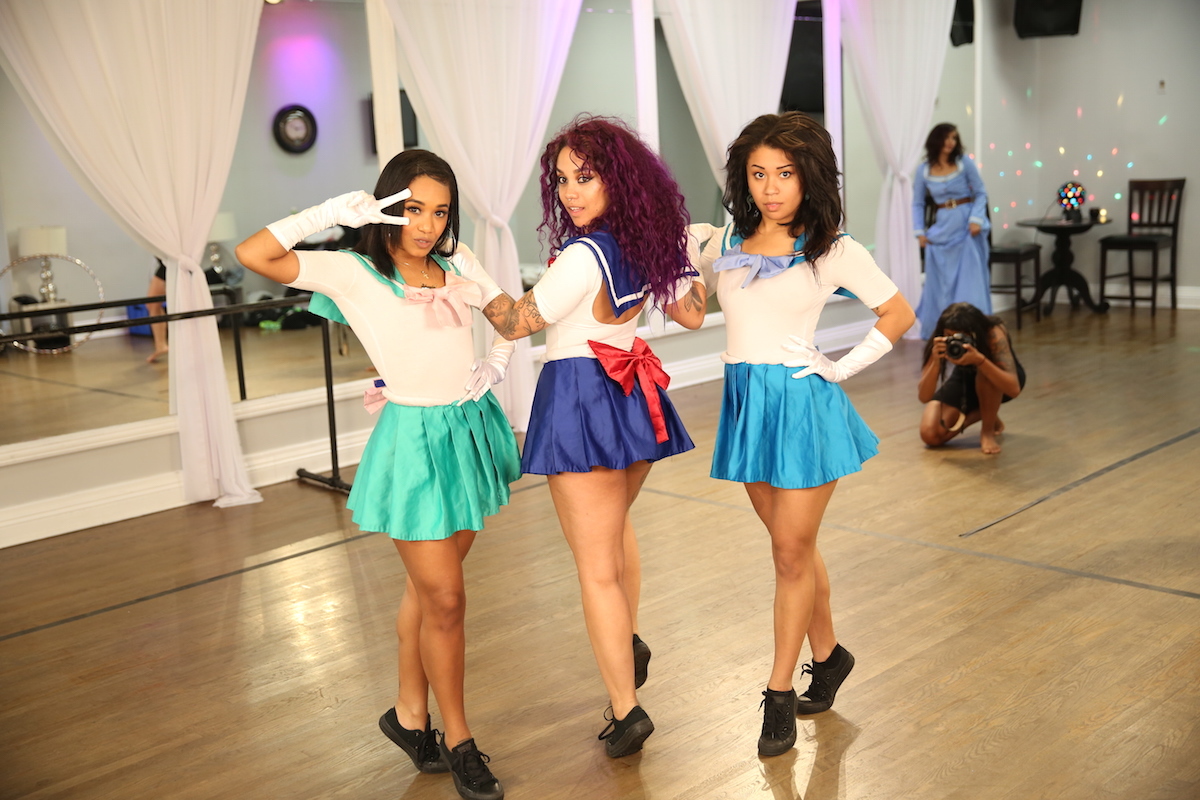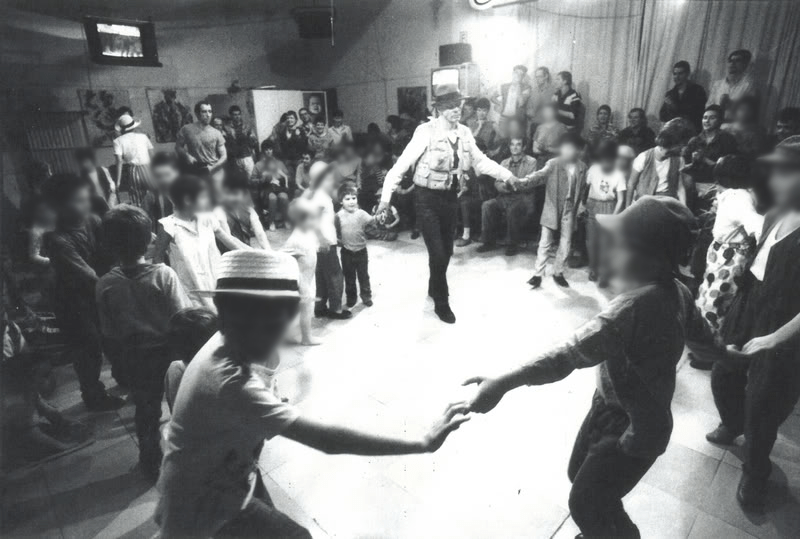This Week in 2007 is a weekly column looking back on Lindsay Lohan, the first iPhone, George W. Bush, and everything else we loved about the year 2007.
At JustDance dance studio, three burlesque performers strip off their Sailor Moon skirts. They aren’t practicing for Comic Con or gearing up for an anime festival. They are Suicide Girls rehearsing for a burlesque show about to tour America.
Videos by VICE
Founded a few weeks before September 11 in 2001, SuicideGirls still exists. MySpace, LiveJournal, Kiki Kannibal, and other mid-2000s internet darlings may have lost their luster, but SuicideGirls continues to attract 6.2 million Instagram followers, almost three million more than the first daughter Ivanka Trump.
Oregon-native Missy Suicide founded the site in her apartment in Portland with her friend Sean Suhl, a.k.a. Spooky. She grew up in Beaverton, Oregon near the Nike headquarters and struggled to fit in with the jocks around town. She idolized girls with tattoos, but found that many of them wouldn’t classify themselves as beautiful. Feminists also stayed away from discussions about sex and body positivity. Missy and Suhul created SuicideGirls as an online community for the girls they idolized and identified with.
Girls posted nude pin-up photos, highlighting their tattoos, and the site attracted the ire of both feminists and the Bush administration. Feminists questioned if women posting their own nude photos counted as exploitation, and in 2005, Racked reports, the US Department of Justice asked the site to take down pictures that could be considered obscene.
Read more: How 2007 Became a Meme
While other 2007 stars, like Chris Crocker, have faded into obscurity as YouTubers profit off the schtick he developed, SuicideGirls has survived. Today, the site attracts over five million users, according to Racked, and is staffed by ten employees.
In between rehearsals, Missy sat down with Broadly to discuss their new 60-date burlesque tour, how she survived the mid-2000s, and why she got the last laugh over the feminists who hated her.
BROADLY: What’s the biggest misunderstanding about SuicideGirls?
Missy Suicide: If you ask any girl what their favorite part about being a SuicideGirl is, she’s going to say the friendships that she made. Most people think that it’s just about nudity and naked pin-up pictures, but it’s really about the community and the friendships that they make. And then about me personally in relation to SuicideGirls, people think I can be a little bit harsh, but I’m really sweet and nice and friendly.
How did the burlesque show come about?
The burlesque show came about because we had done a burlesque show a number of years ago, and it was super popular. They opened for Guns N’ Roses, but it’s a lot of work to put on a burlesque tour, so we decided to take a break, and it just kept extending and extending. Then we decided to put out a book, and we sent two girls out to do a book signing tour. By the time they got to Santa Cruz, there was 500 people outside of a shop. We knew that we could put on a better live show. People want to have the same experience they have on the website in real life where they meet up, and it’s really an extension of the community, where the audience itself has such an amazing energy in it. We wanted to do a pop culture themed burlesque tour. The cosplay Comic Con stuff is very popular. We wanted to be able to take the cosplay element and combine it with the sexy spirit of traditional burlesque and put a modern twist on it.

Photos courtesy of SuicideGirls
What was your original vision for SuicideGirls?
I wanted to create a place where girls can express themselves, feel comfortable being uniquely themselves and being beautiful, and embrace their bodies, because the definition of beauty was so limited in 2001. There was either the stick-thin body type or like the silicon-enhanced blonde Pamela Anderson type. I saw all these beautiful women around me, and none of them were reflected anywhere in society. I wanted to give them a place where they could shine, where they could be themselves, where they could be appreciated for their own beauty and uniqueness. I thought it’d be popular in Portland, maybe Seattle. Fifteen years [later], we now have 3,000 official Suicide Girls from every continent including Antarctica. We have over 250,000 hopeful Suicide Girls, and we get about 50,000 applications every year from women. Our community is quite large. Everybody feels like an outsider at some point in their lives, and the message of being uniquely yourself resonates far wider.
How has the site evolved?
When we started it was just on your computer. You never had internet in your pocket. People use it a lot more on mobile, and they’re using it a lot more frequently throughout the day than they did before. People check in quickly as opposed to having longer sessions. There’s the books, the comics, the burlesque show, the website, our social media. We’ve got over 25 million social media followers, clothing, merchandise. There’s so much. It organically evolved. I didn’t realize there were people who had similar experiences everywhere in the world.
For More News Like This, Sign Up for Our Newsletter
Has the term “Suicide Girl” changed?
The same message resonates today. The term “Suicide Girls” was taken from a Chuck Palahniuk book. It was about girls who chose to commit social suicide by choosing not to fit in. I always hated the term alternative. Coming from Portland, it makes me bristle. Alternative to what? Nobody really claims their identity from the subgenre of music they listen to anymore. Even then it wasn’t like you were just punk rock or hip-hop. I needed a catch-all phrase that embodied the attitude as opposed to the very specific niche element.
[“Suicide Girl” has] become a ubiquitous term. When people send out casting notices, they call for “SuicideGirls type.” It’s almost become as ubiquitous as Kleenex or Xerox. When you say “Suicide Girl,” you know what type of girl you’re talking about.
Did people frown on tattoos back then?
People definitely frowned upon tattoos. No women had tattoos. It was like sailors and army men and that was about it. There was a bit of a classist element. A lot of the flack we got back then was, “How could you do that to your beautiful body? Why would you mark that permanently? Why would you draw on yourself? You were so pretty, and you are ruining yourself.”
When did you get your first tattoo?
I got my first tattoo after I started SuicideGirls. I got the wings on my back like a month after I started SuicideGirls. I’ve had my septum pierced since I was 15. Tattoos and piercings, those were the types of girls in Portland that I identified with and that I thought were some of the most beautiful girls in the world.
I took a lot of flack about calling myself a feminist back then. Now the world caught up a little bit.
Was it nerve-racking creating this platform without having a road map? Now YouTube stars have 700 examples to follow, but in the 2000s, a lot of performers were exploited. How did you overcome that?
I definitely made mistakes. There was nobody for me to look to so I googled contracts and stuff like that. Google existed, but it was brand new. I was like, “I’m just gonna google this contract and see what happens.” I feel like I definitely had my pitfalls. I’m pretty transparent, which I feel like the internet has grown to embrace.
Why do you think feminists rejected you?
There was no body positivity. There was no Slut Walk or any of those things that normalized the fact that women can embrace their bodies and their sexuality and not be persecuted for it. I took a lot of flack about calling myself a feminist back then. Now the world caught up a little bit. We’ll see what the next four years holds for us. If you remember, [second] wave feminists were very [anti-sex]. The fact that I took naked photos of women and put them out there [and said] they’re beautiful [alienated feminists]. Most early feminists thought that using your body to advance was not the way to go.
What did you grandma think?
My grandmother was very Republican, grew up in Orange County, and she was like, “Why are you taking naked pictures of ladies? I don’t understand what you’re doing.” Then after she saw [a SuicideGirls] book and came to a book signing, she was like, “Well, I can see why you’re doing it.” She got to meet some of the girls, and she was like, “Back in my day I think that I would’ve been a Suicide Girl.” For her 75th birthday, we got matching tattoos.
More
From VICE
-

Children at the Friedrichshof Commune dance with renowned artist Joseph Beuys. Inka, aged four, holds his right hand. -

Marilyn, an attorney and former professional dominatrix, poses for a photo with her sub who is fully encased in latex on the Vancouver Fetish Cruise. Photo by Paige Taylor White. -

-

